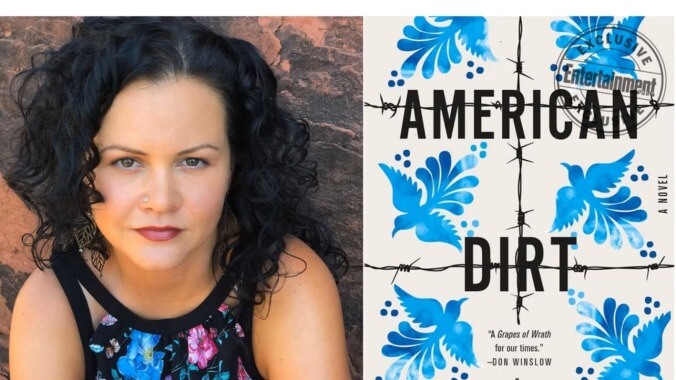Author Jeanine Cummins and publisher respond to American Dirt controversy

This morning, author Jeanine Cummins and publisher Flatiron Books responded to criticism over American Dirt, Cummins’ highly anticipated novel centered around Mexico-U.S. migration. The book, which was published on Tuesday, follows a Mexican bookstore owner named Lydia who flees the country with her 8-year-old son when her family is killed by drug lords. Cummins, a white writer with a Puerto Rican grandmother, has been accused of appropriation and criticized for the book’s stereotypes.
“Not everyone has to love my book,” Cummins told NPR host Rachel Martin this morning. Cummins said that she tried to be culturally sensitive and that her Puerto Rican heritage has been “attacked and sidelined by people who are… attempting to police [her] identity.” In the novel’s author note, Cummins wrote that she wanted to humanize “the faceless brown mass” of Mexican migrants coming to the U.S. The author was evasive at her book launch event at a Barnes & Noble in New York earlier in the week when asked by Shannon Melero, a writer for Jezebel, if she thought her “whiteness played a role in choosing to write this book, and how it was received by the public.” In her piece for Jezebel, Melero writes:
Cummins looked uncomfortable, and her answer made me uncomfortable. She told the room that this was an “important” question that “we should all be asking ourselves.” She said she believed that her status as a white woman who is also Puerto Rican (“you can be both,” she said), as well as her economic status and motherhood, contributed to how she wrote the book. But as for how it was received, she said, she felt she couldn’t speak on it. “That’s not something I’m equipped to answer, nor do I want to.” And with that, she moved on to the next question, discussing how much “goodness” and “hope” she saw “along the migrant trail.”
While also speaking to NPR’s Martin this morning, Los Angeles Times writer Esmeralda Bermudez called the book “cheap entertainment” that does not accurately depict the migrant experience, and said it should not be called “the great immigrant novel.” The book has been hailed as “The Grapes Of Wrath of our time,” earned Cummins a seven-figure advance, has enjoyed a heavy influencer campaign on social media, and is already being adapted into a movie.
Much of the conversation surrounding American Dirt has revolved around cultural appropriation and who is best suited to tell what story. Critics of the book, many of whom are Latinx writers speaking out on social media, have called Cummins’ book stereotypical, harmful, and inauthentic. The controversy has also underscored the publishing industry’s tendency to largely publish and award its highest advances and print runs to white authors, while writers of color are published far less frequently and do not often receive the same inflated advances or publicity support.
In response to the criticism, which included the creation of the “Writing my Latino novel” meme, wherein Latinx writers have parodied American Dirt’s stereotypes, Flatiron Books issued a statement of support this morning. They were proud to publish the book, they said, and were “carefully listening” to the conversation.
American Dirt had been touted behind the scenes in the months leading up to its publication this week, including starred reviews in trade publications Publishers Weekly and Kirkus. But it perhaps wasn’t until The New York Times published its first of two reviews on January 17 that the book and its failings were offered up to the broader public.
“The motives of the book may be unimpeachable, but novels must be judged on execution, not intention. This peculiar book flounders and fails,” New York Times book critic Parul Sehgal said in her pan. As the Times will sometimes do for large-scale releases, it then published a second review of the book, that one by bestselling author Lauren Groff, who is not on staff. Her review appeared two days after Sehgal’s, and while she praised the book as a “swift” page-turner, Groff waffled over whether she, as a white woman, was the right person to review it, just as she wondered whether Cummins was the right person to tell the novel’s story. Groff later expressed her frustration on Twitter, saying, “Obviously I finished my review long before I knew of Parul’s—anyone who has gone through edits knows the editing timeline—but hers is better and smarter anyway. I wrestled like a beast with this review, the morals of my taking it on, my complicity in the white gaze.”
In addition to the two reviews, The New York Times also published a profile of Cummins and an excerpt of the book.
If all that weren’t enough, on January 21, Oprah announced in a video that she had selected the novel as the next pick for her Book Club, in its revamped iteration with Apple TV+, sparking even more outrage.
The following day, a now viral tweet posted by writer Myriam Gurba included photos from a Book Expo dinner party in honor of Cummins that took place in late May. The pictures showed floral centerpieces wrapped in barbed wire, made to match the book’s cover, which many have decried as offensive.
Gurba had written her own scathing review of the book, but according to her, the assigning publication told her she wasn’t famous enough to write so negative a review. When Gurba refused to write something more redeeming about the book, she was offered a kill fee, and later published her review with Tropics Of Meta in December. “Cummins plops overly-ripe Mexican stereotypes, among them the Latin lover, the suffering mother, and the stoic manchild, into her wannabe realist prose,” the review reads in part.
In response to Flatiron’s statement, Sehgal said in a tweet this morning, “The criticism isn’t merely about ‘who gets to tell which stories,’ it’s that this story was told so shabbily.”